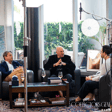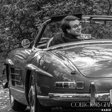
Chris Martin - 190 Years Of Making The Most Collectible Guitars
Today, I have the distinct pleasure of sitting down with Chris Martin, the sixth-generation CEO of Martin Guitars. For nearly 190 years, the Martin name has been synonymous with music, and their iconic guitars have graced the hands of some of the world's most legendary musicians. But the question we explore today is, what is it that has allowed this storied brand to remain at the pinnacle of excellence for nearly two centuries?
The answer lies in Chris Martin IV, who has led the company for over 40 years, all while remaining steadfast to the legacy that has defined Martin from the very beginning. Chris is, by nature, a collector, and upon joining the family business, it became clear that his passion for preservation would extend to Martin's rich history. He has meticulously gathered some of the brand's most prized instruments from the most renowned collections and has created a museum to house them—a museum that is anything but traditional. Rather than a sterile, glass-encased gallery, the Martin Museum invites visitors to engage with the guitars, some of which can even be played. And as we’ll learn during our conversation, Chris is considering letting anyone play the guitars, in exchange for a donation to the Martin Foundation.
Martin Guitars has long been hailed as the gold standard in the industry, and after spending time with the man at the helm, it’s easy to see why. So, without further ado, I’m honored to present Chris Martin, here on Collectors Gene Radio.
Martin Guitar Company - https://www.martinguitar.com/
CollectorsGene.com - https://collectorsgene.com/



















